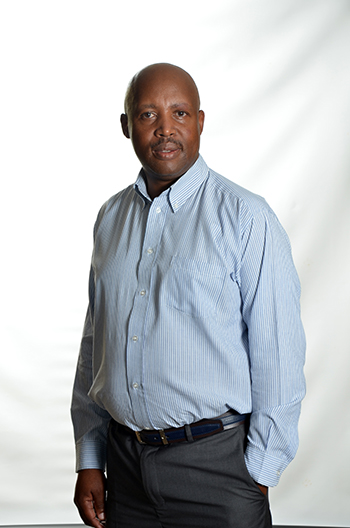Latest News Archive
Please select Category, Year, and then Month to display items
06 April 2018
Photo Rulanzen Martin
 From the left: Dr Thulisile Mphambukeli, leader of the BRICS research team that is exploring the political economy of water and food security, and her research partner, Dr Victor Okorie.
From the left: Dr Thulisile Mphambukeli, leader of the BRICS research team that is exploring the political economy of water and food security, and her research partner, Dr Victor Okorie.
A Brazil, Russia, India, China and South Africa (BRICS) delegation is to hold the 10th Annual BRICS Summit in the last week of May 2018 in Johannesburg. Dr Thulisile Mphambukeli, leader of the University of the Free State (UFS) research team alongside Dr Victor Okorie from the Department of Urban and Regional Planning, in collaboration with Prof Lere Amusan of North-West University, will ensure that water and food security is a prominent feature on the gathering’s agenda.
First, the project titled: “Exploring the political economy of water and food security nexus in BRICS and Africa” will debut at the National Institute for the Humanities and Social Sciences BRICS Think Tank Forum”.
According to Dr Mphambukeli, the key to water security is attitudinal change by means of education and conscientisation. This, she is adamant about, holds the potential to drive behavioural adjustments in the way society interacts with water.
Genetic and social approaches
Dr Okorie asserts that if strides towards reducing the demand for water were to be made, research efforts should be geared towards effecting changes at DNA level. Meaning we need to explore waterwise ways that enable crops and animals to thrive optimally.
The project also looks at social dimensions of water such as flushing a toilet. “Research activities on redesigning toilets, especially the urinal, where more than nine litres of water are used to flush less than one cubic centimetre of urine, are timely in the context of managing water and the food nexus crises,” said Dr Okorie.
Combining the genetic and social approaches would allow us to produce more with a smaller water footprint. This can be made possible by implementing precision agriculture which is about estimating and applying exact quantities of water and nutrients needed for the production of crops or the raising of livestock.
Paradigm shifting policies
Prof Amusan said the team intended to propose functional solutions that take the quality of water into consideration. Equitable production and distribution of water depends on endorsing policies of co-production between citizens, governments and the public sector. BRICS member states mutually consider water and food security as an issue of paramount significance, hence its feature on this prestigious summit’s agenda.
Meet our Council: Mr Rantooa Moji – passionate about the welfare of workers
2017-07-07

Mr Rantooa Moji, member of the UFS Council
Photo: Stephen Collett
Mr Rantooa Moji has recently joined the UFS Council by virtue of being chairperson of the university’s Institutional Forum (IF). The IF’s function is to advise Council in accordance with the Higher Education Act and UFS Statute.
Born and bred in Qwaqwa, Mr Moji is a junior lecturer in Chemistry at the university. He completed his BSc (Hons) in Chemistry at the then UNIN (Qwaqwa), which is now part of the UFS. He also completed an MA (HES) at the University of the Free State.
Fascinated with Chemistry
“I pursued science mainly due to my school background, but I also have a keen interest in the subject. The diverse applications of Chemistry in daily life have always fascinated me and that is why I chose to pursue it,” he says.
During his postgraduate studies at the UFS, Moji was exposed to education and management trends in higher education. He has subsequently become involved with labour relations issues through the personnel union Nehawu. He says he has a passion for the welfare of workers and therefore fulfils a number of roles in the union, including representing members in disciplinary and grievance hearings, being part of the negotiations team, and representing the union on a number of institutional committees, such as the Health Care Committee.
Passion for worker’s welfare
Says Mr Moji: “I feel that my experience as an academic and a union activist puts me in good stead to ensure that the views and aspirations of employees are taken into account in the Council’s deliberations and decision-making.”
Mr Moji is married, with two daughters and one son.